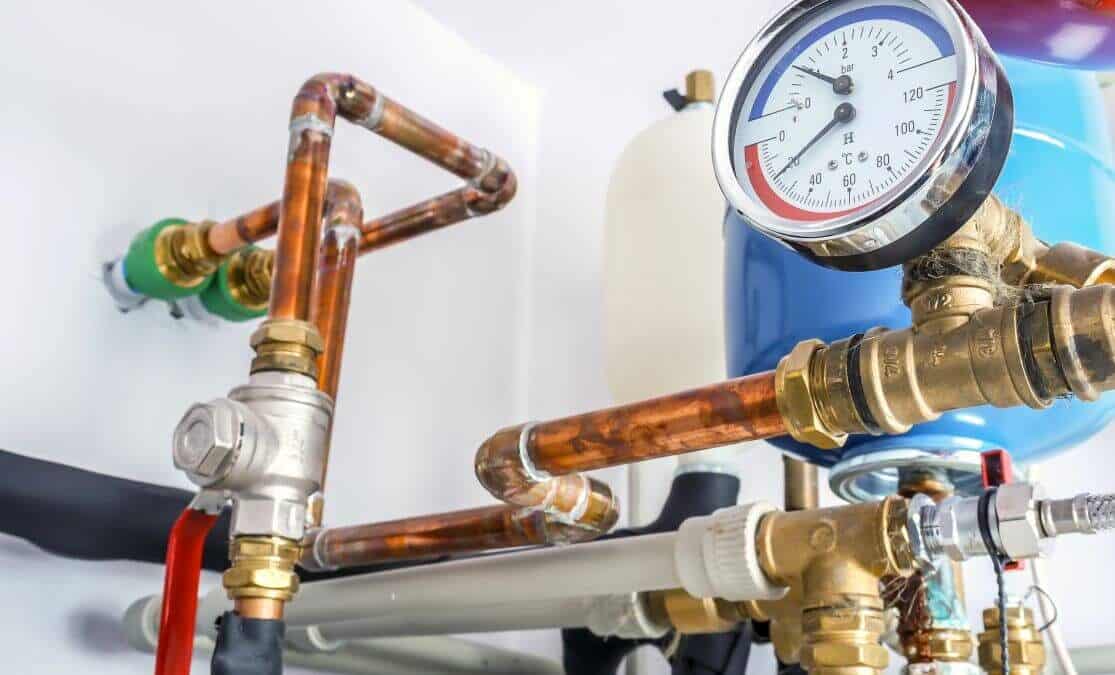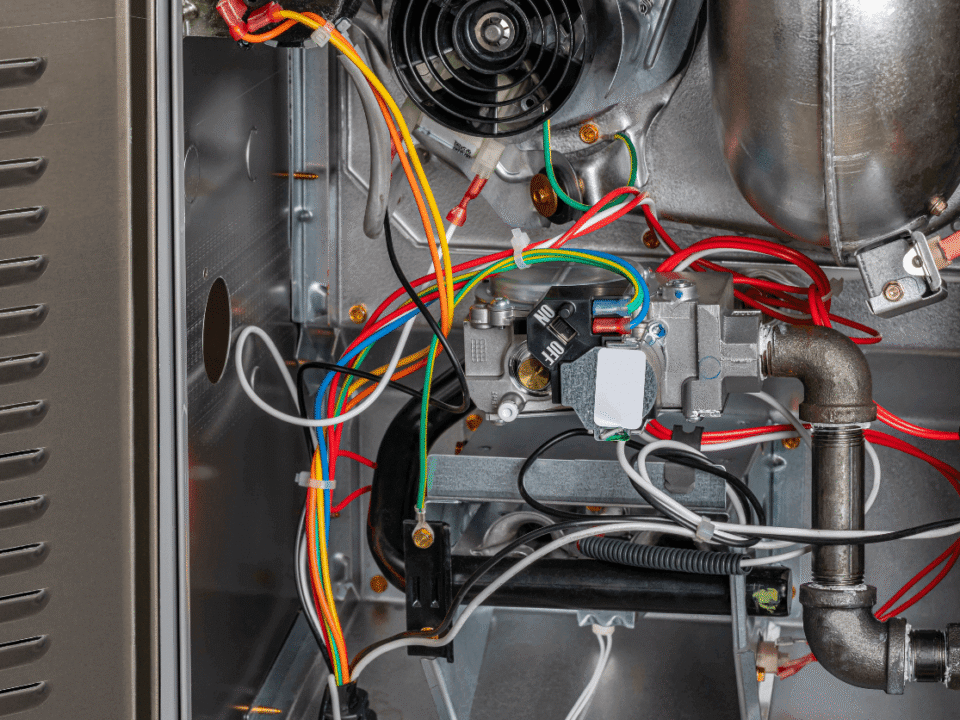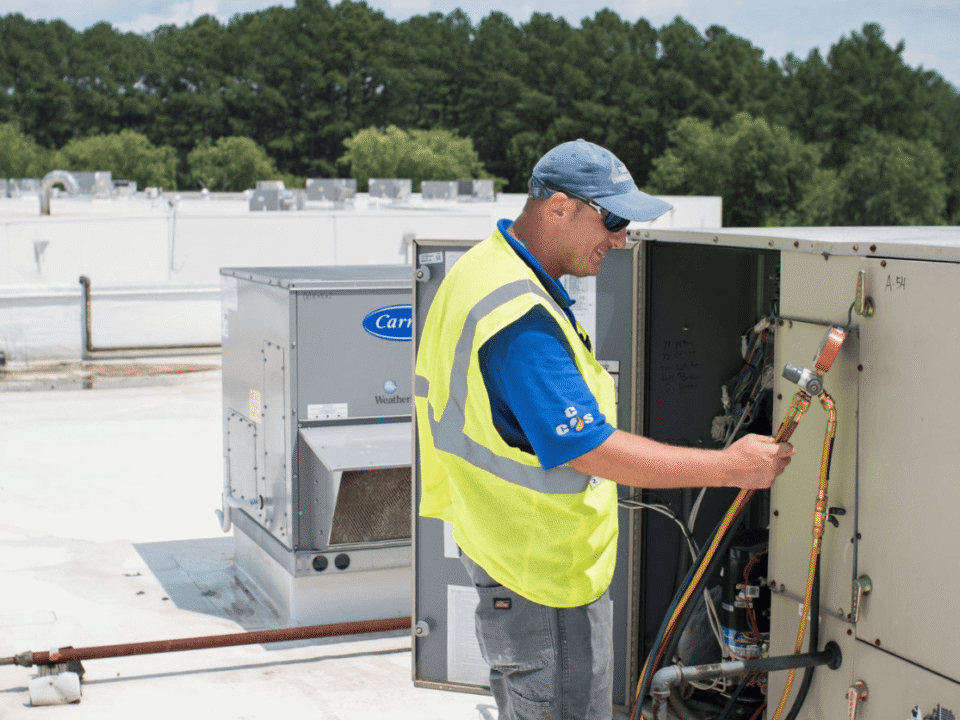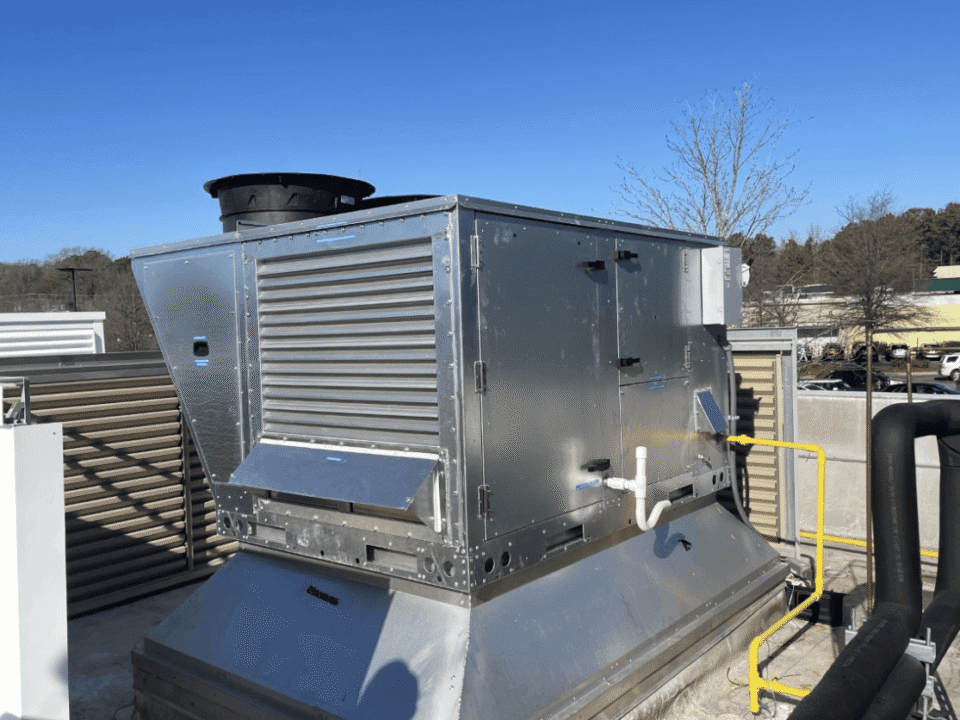
Top 5 HVAC Failures to Avoid as the Seasons Change
August 21, 2025
8 Common Heating Problems in Commercial Buildings and How to Solve Them
September 25, 2025Everything your business needs to know about this heating option
When it comes to heating large commercial buildings in the Raleigh area, few systems are as reliable and efficient as a commercial boiler. Commercial boilers are often the backbone of a facility’s heating infrastructure. But despite their importance, many property managers and business owners don’t fully understand how these systems work or how to choose, maintain, and optimize them.
This guide offers a deep dive into commercial boiler systems: what they are, how they operate, types available, how to maintain them, and how to select the right one for your property.
What Is a Commercial Boiler System?
A commercial boiler system is a pressurized system that heats water (or generates steam) and distributes it through pipes to provide heat throughout a building. Unlike residential boilers, which serve a single-family home, commercial boilers are designed to meet the demands of much larger spaces, often across multiple zones or floors.
These systems are typically found in:
- Office buildings
- Schools and universities
- Hospitals
- Apartment complexes
- Hotels
- Manufacturing plants
In Raleigh’s climate, where winters are relatively mild but can still see below-freezing temperatures, having an efficient and well-maintained boiler system is essential for comfort and energy savings.
How Commercial Boilers Work
At a basic level, a commercial boiler follows this process:
- Fuel Source Ignition: The boiler burns a fuel such as natural gas, oil, propane, or electricity to create heat.
- Heat Exchanger Activation: This heat warms up a heat exchanger, which in turn heats water or creates steam.
- Distribution: The heated water or steam is pumped through pipes to radiators, fan coils, or air handlers in different parts of the building.
- Recirculation or Exhaust: Used water returns to the boiler to be reheated, while combustion gases are vented outside via a flue or chimney.
Modern commercial boilers include a variety of control systems, pressure valves, safety shut-offs, and remote monitoring features that help optimize performance and safety.
Types of Commercial Boilers
When considering a boiler system, understanding the different types can help you make the right investment:
- Fire-Tube Boilers: Hot gases from combustion pass through tubes surrounded by water. Great for low to medium-pressure systems. Simple, compact, and cost-effective.
- Water-Tube Boilers: Water circulates through tubes that are heated by combustion gases. Better for high-pressure applications. Larger and more expensive but more efficient for large facilities.
- Electric Boilers: Use electricity instead of combustible fuel. Clean, quiet, and great for areas with strict emission regulations. Can be expensive to operate in areas with high electricity rates.
- Condensing Boilers: Capture and reuse heat from exhaust gases. Extremely efficient – often above 90% AFUE. Ideal for Raleigh’s variable temperatures and energy-conscious businesses.
Choosing the Right Boiler for Your Facility
When selecting a new commercial boiler for your building, we’ll consider the following elements:
- Building Size and Load Requirements: Larger buildings require more BTUs (British Thermal Units) to heat. Our HVAC professionals can perform a heat load calculation to determine the exact size needed.
- Fuel Type: Natural gas is widely available and cost-effective. However, in areas where gas lines are not available, propane or electricity may be viable alternatives.
- Efficiency Ratings: Look for systems rated with AFUE (Annual Fuel Utilization Efficiency). High-efficiency boilers might cost more upfront but can yield significant savings on utility bills.
- Controls and Automation: Modern commercial boilers can be integrated with building automation systems (BAS) for optimal performance and energy savings. Smart thermostats and load-balancing tools can further reduce operating costs.
- Zoning Needs: Multi-tenant buildings may require zoning systems, where different areas can be heated independently. This ensures greater comfort and control across diverse spaces.
Maintenance: The Key to Longevity and Efficiency
A properly maintained boiler system can last over 15 years. Here are essential maintenance practices:
- Annual Inspections: Have our certified technicians inspect your system at least once a year. We’ll check all necessary components, including pressure relief valves, ventilation and exhaust systems, and safety controls.
- Regular Flushing: Sediment buildup can significantly reduce efficiency. Systems should be flushed periodically to remove scale and debris.
- Water Treatment: Using chemical treatment or water softeners can extend your system’s life and prevent scaling.
- Leak Checks: Boilers under pressure can become dangerous if leaks occur. Regularly checking for water and fuel leaks protects the system and the people inside the building.
Learn more about our commercial planned HVAC maintenance service on our website.
Signs Your Boiler Needs Repair or Replacement
Ignoring early warning signs can lead to costly downtime. Be on the lookout for:
- Uneven heating across the building
- Rising energy bills without increased use
- Strange noises (clanging, banging, hissing)
- Water leaks near the boiler
- Yellow or irregular burner flames (could indicate incomplete combustion)
- System cycling on and off too frequently
In some cases, replacing an outdated system with a high-efficiency model may be more cost-effective in the long run.
Boiler Retrofits and Upgrades
If your current boiler is working but aging, a retrofit can modernize the system without a full replacement. Retrofitting might include:
- Installing new burner systems
- Upgrading controls
- Adding economizers or blowdown heat recovery systems
- Converting from steam to hot water
These upgrades can enhance performance and bring older systems into compliance with current regulations.
Final Thoughts
Commercial boiler systems are essential for heating large buildings efficiently and safely. As Raleigh’s trusted commercial HVAC partner, we’re here to help with:
- System design and sizing
- Energy-efficient upgrades
- Installation and replacement
- Preventive maintenance plans
Ready to upgrade or maintain your boiler system? Contact us today to schedule an on-site evaluation or to learn more about the best commercial heating solutions for your business.
Learn more about factors to consider when selecting a system on our blog.



